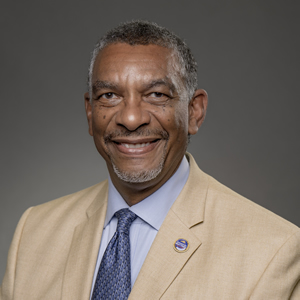President’s Message: Workforce shortages, nontraditional learners, P-16 partnerships take center stage in 2023
February 09, 2023

Here at the Council on Postsecondary Education, we’ve honed in on some areas of focus for 2023, based on the values outlined by our 2022-2030 strategic agenda and with an eye toward our North Star goal of raising the number of Kentuckians with a high-quality postsecondary degree or credential to 60% by 2030. These priorities were also guided by hundreds of hours of conversations with educators, state officials, students and business leaders as well as quantitative data on the state’s progress toward our education attainment goals.
Addressing the healthcare workforce shortage
In 2021, we created the Healthcare Workforce Collaborative with the support of federal funding provided to CPE by the General Assembly. The Legislature asked CPE to convene higher education leaders and healthcare employers to find innovative ways strengthen the healthcare workforce pipeline. The effort has been highly successful so far, but there is much left to do.
Our hope is to expand the scope of the Healthcare Workforce Collaborative to include a broader spectrum of health professions, including mental and behavioral health. The State of Mental Health in America 2022 ranks Kentucky 30th in mental health workforce availability, and more than half of the people with diagnosed mental illnesses don’t get the treatment they need. We can see the effects of this on college campuses. A national survey of college students returning to campus this past fall showed that nearly 70% are experiencing mental health issues related to anxiety or depression.
Addressing the teacher workforce shortage
Kentucky is facing a serious teacher shortage caused by the pandemic, concerns over school safety, retirements, high rates of attrition among new teachers and other factors. According to the Kentucky Department of Education, 72% of the state’s full-time teachers are at risk of leaving the profession.
The Commonwealth Education Continuum, a collaborative between KDE, CPE, the administration, and other education organizations, is focused on helping address this crisis through a range of strategies. They include improving program alignment and transfer between two- and four-year public colleges, flexible programming to include credit for prior learning programs to shorten time to graduation, flexible field experiences, alternatives to the teacher licensure assessment, and wraparound supports for students.
Easing transitions from K-12 to college
Getting high school graduates to college and keeping them there until they graduate is necessary to strengthen our workforce and grow our economy. However, the percent of Kentucky high schoolers who attend college right after graduation continues to fall. Over the last five years, this percentage has fallen from 59% to 54%, compared to the national average of 66%. Alarmingly, the trend is accelerating, declining 3 percentage points from 2019 to 2020. The in-state college-going rate is substantially lower (47.9%).
Our plan for this area includes increasing college readiness through an online platform that incentivizes enrollment through micro-scholarships and other strategies and provides a forum for students to build relationships with schools. Simplifying the college application process and strategies to increase FAFSA completion also are high priorities.
Increasing college access for working-age adults
Kentucky’s workforce participation rate is among the lowest in the nation, limiting the state’s economic potential. Contributing to our low workforce participation rate is the lack of credentials and degrees among working-age adults. College enrollment is starting to stabilize after the pandemic, but the decade-long decrease in adult enrollment continues, with undergraduate enrollment among working-age adults falling 50% since 2012-13. CPE launched an adult learner action agenda to help guide state and campus policy. Strategies include improving outreach and communication, strengthening advising and wraparound services, breaking down financial barriers, and expanding flexible academic programming to better meet the needs of busy adults who are struggling to balance the competing demands of work, life, family and school.
My staff and I are energized by our expanding role in the state’s workforce development space, and we are equally excited to continue finding innovative ways to partner with K-12 educators and our campuses to make education accessible to Kentuckians in every stage of life.

President
Last Updated: 2/10/2023
